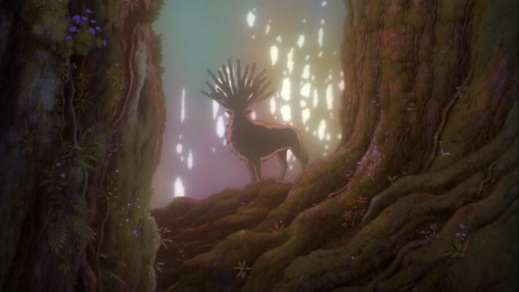Deer have been wandering through the woods/swamp behind my house in the mornings, it's on their route from one place to another. I love how they're both present and invisible. You have to wait for them to move to see them, just ripples in the air, they blend in so well, but with watching eyes and their white-flag tails if they're startled.
I think with their camouflage they could wander across worlds and dimensions and centuries. It makes me understand why the shishigami, the forest spirit, in Princess Mononoke, is a deerlike creature.

He grants both life and death; maybe he moves between those worlds or states.
And it gives me new insights into the end of Chekhov's short story "Ward No. Six," where the main character, just before dying, has a vision of deer:
(The collection of Chekhov short stories from which this is taken is available to read for free on Project Gutenberg).
I remember almost nothing about that story, except that image. ... I might reread the story. I took three books with me to England when we lived there as a family; a collection of Chekhov short stories was one, and I read and loved most of them. My memory isn't what it might be, but I know what roads to walk down to recover things.
And deer know all the roads, and how to be a part of the landscape and yet not of it. That's their magic.
I think with their camouflage they could wander across worlds and dimensions and centuries. It makes me understand why the shishigami, the forest spirit, in Princess Mononoke, is a deerlike creature.

He grants both life and death; maybe he moves between those worlds or states.
And it gives me new insights into the end of Chekhov's short story "Ward No. Six," where the main character, just before dying, has a vision of deer:
There was a greenness before his eyes. Andrey Yefimitch understood that his end had come, and remembered that Ivan Dmitritch, Mihail Averyanitch, and millions of people believed in immortality. And what if it really existed? But he did not want immortality—and he thought of it only for one instant. A herd of deer, extraordinarily beautiful and graceful, of which he had been reading the day before, ran by him; then a peasant woman stretched out her hand to him with a registered letter . . . . Mihail Averyanitch said something, then it all vanished, and Andrey Yefimitch sank into oblivion for ever.
(The collection of Chekhov short stories from which this is taken is available to read for free on Project Gutenberg).
I remember almost nothing about that story, except that image. ... I might reread the story. I took three books with me to England when we lived there as a family; a collection of Chekhov short stories was one, and I read and loved most of them. My memory isn't what it might be, but I know what roads to walk down to recover things.
And deer know all the roads, and how to be a part of the landscape and yet not of it. That's their magic.